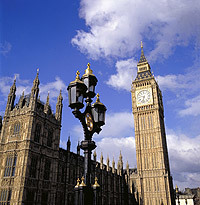
Two strikes, several picket lines and a 7 month campaign later, the House of Commons cleaners have secured a pay rise and new rights for themselves. Strikes were held before and after last year's summer recess by the cleaners who were being paid below the accepted £6.70 "living wage" for London and were working 11 hour shifts for £5.00 an hour (in some cases, less than that) without sick pay, without pensions and only 12 days' holiday.
Today's triumph has changed the cleaners' status from the lowest paid in Europe to something a bit more valued. In a deal agreed with the Transport and General Workers Union (TGWU), the workers' hourly rate will increase in stages from £5.20 to £6.70 by next January and they will all be entitled to 28 days holiday and sick pay. This is an improvement, not just fiscally but also in increasing respect for the cleaners as hard-working people who are doing a dirty job.
However, though the struggle for fair treatment and better pay seems to have been won, one element within the overall issue remains unsolved. The media have been keen to portray the House of Commons as an unscrupulous employer that has no qualms in hosting debates about poverty in its chambers yet pays its own cleaners a below average wage. But the House of Commons only employs the cleaners at the heart of this campaign through a contractor. The contractor promises X number of staff to work Y number of hours for Z amount of money.
The most attractive offer is obviously the cheapest and most value for money and so the House of Commons plumps for the contractor who will provide the most staff for the lowest cost - the only people losing out in this arrangement are the cleaners themselves who get paid the bare minimum in wages, have no sick leave and very few days holiday in order to fulfil the exploitative contract at the heart of this matter. What remains unresolved is how the House of Commons came to an agreement with a contractor whose bottom line is to basically exploit its workers, and what will happen in the future when the House wants to contract out some other grubby job that has to be done.
Throughout this campaign, the high profile of the House of Commons has obscured the issues surrounding contraing out work like cleaning and how it is a minefield of unscrupulous behaviour and unfair treatment when not investigated or thought out thoroughly. There are contract cleaners working all over London in venues far less well-known who suffer a lack of rights and unacceptable wages through unfair contract deals. This victory for the House of Commons cleaners is more than just a one-off David and Goliath tale: congratulations to the campaigners and may their triumph today be the first of many more to come.



